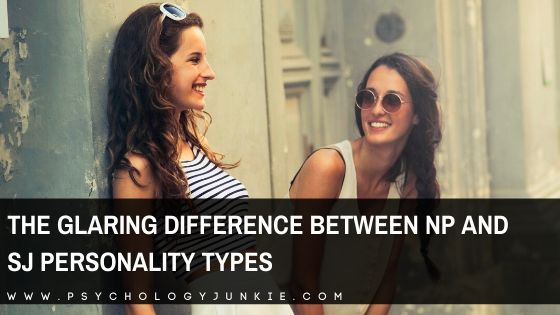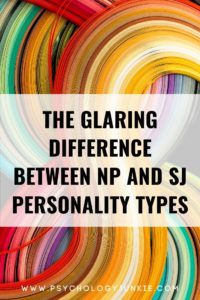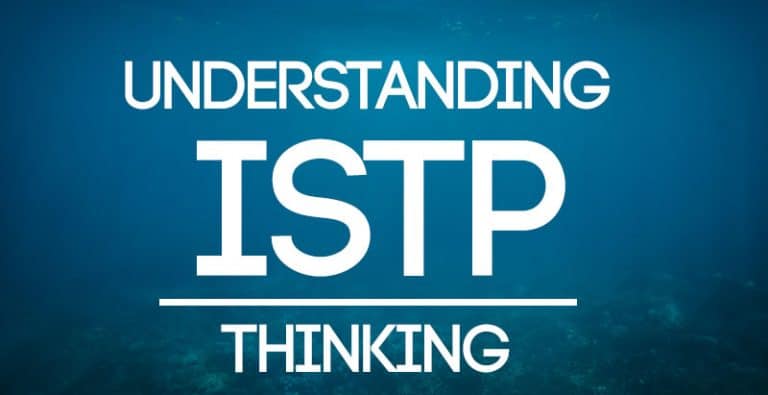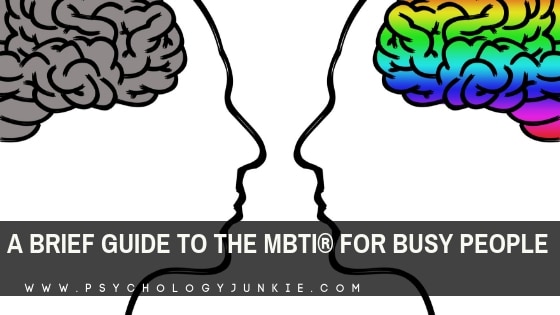The Glaring Difference Between SJ and NP Personality Types
As an ISFJ, “unsettled” is my least favorite word. “Change” also gets me going. But my NP friends love these terms. Where I see a danger in the major life shifts that are, seemingly, forced upon me from the heavens, they see potential in what could come from not being tied down. They can even be energized by having a loose determination on things.
Can’t relate.

There is a particular sense of conscientiousness that SJs breathe to survive that NPs seemingly reject or expect others to fulfill for them. SJs need grounding and stability and will provide it for others, if allowed. NPs, on the other hand, might see a “need” for this, but do not plan their lives around it. NPs exist to explore, learn, and create, regardless of what’s occurring in their environment. SJs want this too, but not at the expense of their duties.
As both subgroups pivot on the Introverted Sensing-Extraverted Intuition axis, it can sometimes be difficult to know which function is valued most. I mistyped as an INFP for a solid year before recognizing how focused on meeting sensory expectations I was, especially in comparison to my NP counterparts. The core difference I’ve seen between SJs and NPs is their awareness of what needs to be done in the sensory realm and whether they privilege those concrete needs first or their mental sphere first.
Estimated reading time: 8 minutes
SJ Corner
I’ve noticed that SJ types need to have their environment sorted out before they can jump into contemplation or focus on anything “fun.” They often hyper-actively control their environment on the front end so that they can contemplate things freely on the back end. The sensory needs to be nailed down, otherwise, their mind will be humming with all the things they didn’t do and they will not be able to focus on the present. These tasks often include cleaning up obvious messes, paying the bills, and getting errands done. The SJ will feel compelled to complete everything that “needs” done (or everything that has become a need to get done by way of a routine) before they can settle into their space. Once settled, they are more willing to use their Ne for fun strides like writing stories or thinking through the possibilities that their day has brought them. Generally, however, they only allow themselves this creative mindset once tasks are accomplished. In our day and age, this can look a lot like completing a to-do list and jumping on the internet to explore endless ideas that lay at our fingertips.
I do not want to give the wrong impression in saying that SJs are generally clean and only care about practical needs, because this isn’t the case. SJs know that to keep a ship afloat one must make sure it doesn’t sink. They focus on sensory maintenance. This often translates to SJs getting, what others might say are, “the tedious bits of the day” accomplished first so that they can take comfort in wherever the joy of their Ne brings them later. SJs are quite aware of what they want to get done in a day and whether that includes cleaning or mud wrestling, they’re going to do it. This holds true to how they interact with others. Many SJs attach themselves to the concept of “keeping one’s word.” If an SJ has determined something is necessary (helping a friend move or attending a party they “gave their word they’d show up to”) they will not back down from completing the task, especially if the task includes other people. Sensory needs are pivotal.
NP Corner
In contrast to SJs, NPs put more emphasis on their Ne, exploring the wavelengths of whatever new concept has struck their fancy. Ne users tend to acknowledge that keeping a routine is important, at least in theory. For NPs, their draw to life is contemplation. They don’t need a clean house, their bills paid on time, or any set of concrete structures in order to think freely. Not running errands won’t bother them until they suddenly run out of food or some other clear and severe sensory item is missing that sparks a fierce, “Oh, crap! I forgot to go shopping.”
An SJ would never.
However, similar to SJs, NPs cannot be defined by the specific characteristics that seem to denote they always have their heads in the sky and never find earth. Certainly, many NPs have clean homes, are concerned about their bills, and so on. However, NPs simply privilege the state of their mental capacity over their sensory environment. Their mental stimulation matters most, that is, until the sensory needs aren’t met in such a substantial manner that it affects their will to contemplate. Thus, they can go quite a while without external upkeep. For an SJ, the world would be melting if their environment wasn’t addressed before its tipping point.
What Does Valuing Si over Ne Look Like In Real-Time?
I recently moved across the United States. Fun. I could barely concentrate on anything but accomplishing the move, which included making sure our addresses were switched over, our license plates were switched over, our insurances were switched over, and so on. It was quite a lot of change, which Si doms are known for avoiding, but I tracked the details, made the lists, cried a bit, and did what I had to in order to survive it. The moment I entered my new home, I began unpacking and didn’t stop until I’d finished. My running thought was, “My stuff is not in its place and I need it in its place.” I’d needed things settled. Pots in the cupboard and toilet paper in the bathroom. Relief flooded me once all of what I had deemed necessary was accomplished. I’ve heard the term “homeostasis” attached to Si, which applies here as my basic interest was to get things level and running smoothly like they “should” be. I am an animal of comfort, and to be comfortable, I needed things in their designated area and running smoothly.
Juxtapose this with an NP friend of mine who moved into a new place two months prior and has yet to unpack all of their things. Their brown moving boxes were piled so high during our video chats that I couldn’t help but see them and wonder how she didn’t think these items were wounds that needed healing stat. Upon asking them why they hadn’t fully unpacked yet, after two months, my friend said it “wasn’t important” and “I’ll get to it later.” “When?” I said. “A year from now?” She laughed a “maybe,” but we both knew it was likely. I had wanted to help this friend sort their things out, but with them living far across time and space, that wasn’t an option.
I’d have sent a droid to help, if I could have.
There are, of course, other ways to distinguish between a higher Si and a higher Ne user through the lens of conscientiousness. Typically, and I say typically when a Si user makes an appointment with someone, they stick to it and treat it as law. They hold so steadily to their planned activities that it is a full-frontal assault if the other person doesn’t show up for their agreed-upon meeting (without good reason). They may on the surface appear fine, but are likely imploding.
High Si users often do not commit to things that they cannot fulfill and expect, wrongly, that others go about the realm in the same way. SJs know their capacity and comfort levels, once learned, and are open about their ability in this way. It is a definite strength. Whereas Ne users are more concerned with flow. They are less tied to meeting at this exact time, on this exact date. They seem to have a general awareness that plans change. That meetups are near always tentative and could shift even a minute prior to a lunch date, which would drive an SJ right on up the wall. Similarly, an SJs frustration at a planned meeting not being met would irk an NP. Why get so frustrated over something so fickle as time? The NPs in my life love to casually hum things like “let’s reschedule,” “it’ll happen when it happens,” or my personal favorite, “I will make it work next time.”
Can you hear my cough?
We Need Each Other
To be fair, an NPs ability to move about freely without restriction is envious. I often wonder what it would be like to not care so readily about deadlines or things that could hurt my own sense of homeostasis. Their lack of focus on what I naturally focus on often lets me breathe for a bit. They let me contemplate outside of whatever duties I attach myself too. They are a great, great joy in my life. Can they frustrate me? Of course! Do I frustrate them? Certainly! But I value them for their malleability, even if it goes against my nature.
SJs and NPs certainly need each other to balance out their privileged functions. Generally, SJs are steady in their daily lives. They have objectives they wish to meet and make the moves to meet them. They see it as their duty to be present when called upon. On the flipside, NPs are often open to possibility. They utilize their loose hold on reality to formulate options that others don’t see. SJs need NPs in their lives to show them there’s more to life than sensory maintenance and NPs need SJs for that very maintenance they aren’t as aware of.
About Jami:

Jami Cannon is an MBTI® enthusiast who hopes to shed more light on the SJ experience. She holds a very stereotypical degree in History (MA) and loves to learn all she can about the people around her.
Other Articles You Might Enjoy:
Here’s What Gives You a Sense of Magic and Meaning, Based on Your Personality Type
The Comfort Zone of Every Myers-Briggs® Personality Type
Here’s What Makes You Dangerous, Based on Your Personality Type









Wow, I felt like I was reading my own words in this article. I do like to travel and go on vacation. When I studied abroad two years ago my inferior Ne needed to account for every possibility that can potentially go wrong. I make up for this by making sure all of that sensory stuff is taken care of (i.e. packing sunscreen and insect repellent, making sure I have all of my medicine, and going to the doctor). It’s amazing to me how the NPs just go into experiences like this with optimism. I definitely agree though that SJs and NPs need each other!
Brilliant and insightful. as an INFP I appreciate the stability and grounding SJs bring into my life and i never understood how organisation and structure was so. Important for them in order to feel safe and secure. I’m not like that at all I can function totally fine in chaos since i see too much order ad kind of constricting/stifling(maybe because i strive with internal. Vs external organisation more?) HOWEVER I absolutely see and understand the need for grounding and stability as the basis for creativity and exploration to flourish
Thanks for sharing
For NPs, their draw to life is contemplation. They don’t need a clean house, their bills paid on time, or any set of concrete structures in order to think freely. Not running errands won’t bother them until they suddenly run out of food or some other clear and severe sensory item is missing that sparks a fierce, “Oh, crap! I forgot to go shopping.”
A step further only when the tower connecting us to the sky literally starts crumbling do we get dragged back to practical necessities lol
I’m an INFP gratefully wed to a very functional ISTJ who sees to the minutiae. He pays all the bills, usually early (in case something goes wrong). His desk is positioned for him to spot when the mail-truck arrives so he can sort the mail, early. We even arrive at parties early, but that has worked out fine for me because now we don’t get invited to as many parties.
That said, I have worked to be organized myself. Among other things, I have taught myself to make lists.–to-do lists, grocery lists, you know what I mean. I find so many creative ways to make lists. Making lists becomes an art form. They are scattered around the house on various bits of origami and cut-up Christmas cards, or permanently lingering on the many blackboards, whiteboards, and bulletin boards that too have become their own inviolable works of art as chalk and markers multiply in wild colors and….and you should see the fridge….magnetic poetry….
Oh, right. Lists. I was making a list. {sigh}
Firstly, thank you so much for posting this succinct article that colourfully illustrates the differences between NPS and SJs – I think it’s so common for the two temperaments to mistype as one other! Personally, I’m an INFP but have thought for a while that I could be a J because I am conscientious with my work,wanting to complete tasks on time, leave myself reminders to pay bills and stick to appointments, being a bit nervous about negative sudden changes…but my natural mode of operation is more focused on my headspace and feelings. I make plans, but then on the day the details and timings of what I’m going to do can change! Or if something else occurs that is more important I’ll scrap plans. I make appointments and then forget to write them on my calendar and just leave the card stub with the date and time written on in my purse…only to get a text reminder the night before and be like “oh gosh?! I forgot!”
To be honest, I TRY to be more organised, efficient. I really do admire people who have that stable “ducks in a row” energy. This is why I believed I was an ISFJ. But this is not my default. I need help and guidance to keep on track. I always feel like a big kid trying to adult as best as I can without getting caught out 🙂
My friend and I just read your article.
It is too obvious that this article is written by an SJ. It’s biased and doesn’t offer a kind equal portrayal of the amazing NP. You left out all the great things about NPS.
Hey Jami,
Is it possible for me to ask you something about this article in private. What you said here has me really intrigued, and I’m hoping to get some insight.
I am INFP, my husband is ISFJ and he usually says to me “You are gonna live long.” when I don’t notice crumbs on the carpet. But I think he is gonna shorten my life with all the critics on my disinterest for tidiness, chores and routines.